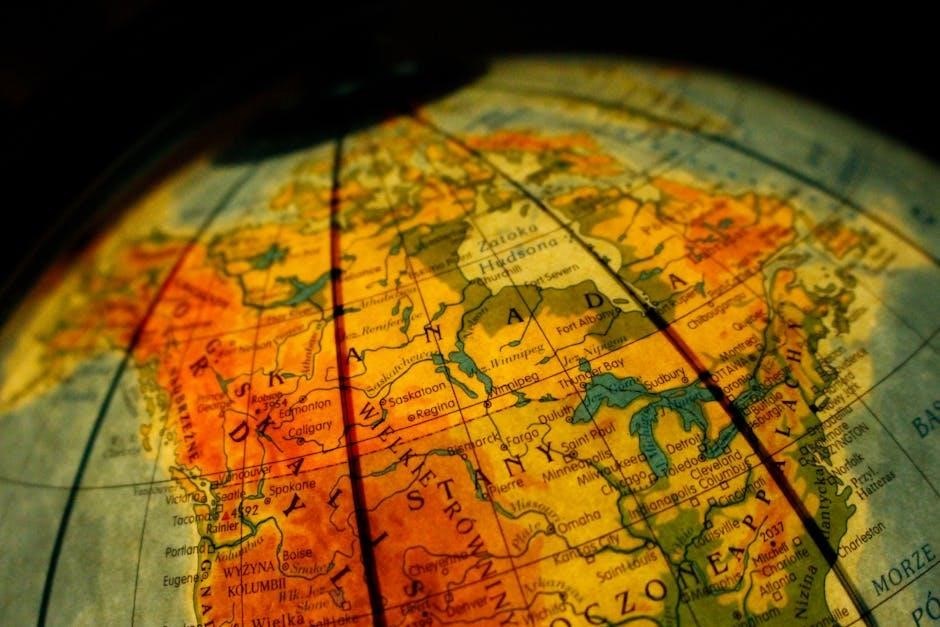A History of the World in 6 Glasses by Tom Standage explores how six beverages—beer, wine, spirits, coffee, tea, and Coca-Cola—shaped human history and culture.
Overview of the Book and Its Unique Perspective
A History of the World in 6 Glasses by Tom Standage offers a fresh perspective on world history by tracing the development of human civilization through six iconic beverages: beer, wine, spirits, coffee, tea, and Coca-Cola. Each drink represents a distinct era, from ancient Mesopotamia to modern times, and reveals how these liquids shaped culture, trade, and societal progress. Standage’s approach is unique, as he uses beverages as a lens to explore broader historical themes, such as technological innovation, economic systems, and social dynamics. By linking everyday drinks to pivotal moments in history, the book provides an engaging and accessible narrative that highlights the interconnectedness of global cultures and the enduring impact of these liquids on human life.
The Role of Beverages in Shaping Human History
Beverages have played a central role in shaping human history, serving as catalysts for cultural, economic, and technological development. From ancient civilizations to modern times, drinks like beer, wine, and spirits influenced trade, colonization, and social structures. These liquids not only quenched thirst but also facilitated the exchange of ideas, resources, and power. Beer, for instance, was integral to the rise of agriculture and urbanization, while wine became a symbol of wealth and sophistication in ancient Greece and Rome. Spirits later fueled exploration and the colonial era, driving global trade and cultural exchange. Coffee and tea, with their stimulating effects, sparked intellectual movements and shaped modern society. Coca-Cola, as a global brand, reflects the homogenization of culture in the modern world. Each beverage represents a unique chapter in humanity’s journey, illustrating how liquids have shaped our shared history.

The Six Signature Beverages
Beer, wine, spirits, coffee, tea, and Coca-Cola are the six signature beverages that have uniquely shaped human history, culture, and globalization, as detailed in Tom Standage’s work.
Beer: The Drink of Ancient Civilizations
Beer played a pivotal role in the rise of ancient civilizations, serving as more than just a source of intoxication. It was a nutritious drink, safer than water, and a staple in diets; Ancient societies, such as the Egyptians and Sumerians, revered beer for its cultural and religious significance. The process of brewing beer also spurred technological advancements, including pottery and writing, as recipes and transactions were recorded. Beer’s influence extended to social structures, fostering communal gatherings and trade. Its role in settling communities and promoting agriculture highlights its enduring impact on human development. As Tom Standage illustrates, beer was not just a drink but a cornerstone of early civilization, shaping societies and laying the groundwork for modern urban life.
Wine: The Beverage of Ancient Greece and Rome
Wine emerged as a cornerstone of ancient Greek and Roman culture, transcending its role as a simple beverage. In Greece, wine was deeply intertwined with religion, philosophy, and social life, often served at symposia where intellectual debates flourished. The Greeks revered Dionysus, the god of wine, and viewed it as a gift from the gods. Similarly, in Rome, wine became a staple of daily life, consumed by people of all classes. It was also used in religious rituals and as a form of medicine. The production and trade of wine spread throughout the Mediterranean, establishing it as a symbol of wealth and power. Tom Standage highlights how wine influenced art, literature, and politics, shaping the identity of these civilizations and leaving a lasting legacy in Western culture.

The Rise of Spirits and Their Global Impact
Spirits emerged in the 17th century, revolutionizing global trade and culture as a valuable commodity that shaped economies, colonization, and the flow of wealth worldwide.
Spirits: From Medieval Europe to the Colonial Era
The origins of spirits trace back to medieval Europe, where monks refined distillation techniques, creating potent beverages like brandy and whiskey. By the 17th century, spirits like rum emerged, becoming central to global trade and colonial expansion. Rum, in particular, played a pivotal role in the triangular trade system, linking Europe, Africa, and the Americas. Its production relied on sugar from the Caribbean, which was cultivated using enslaved labor. Spirits not only fueled economic systems but also shaped cultural practices, serving as currency in some regions and fostering social interactions. The rise of spirits marked a significant shift in how alcohol influenced both economies and societies, bridging the gap between medieval traditions and the dawn of globalized trade networks. This period underscored the profound impact of distilled beverages on the course of human history.
The Economic and Social Influence of Spirits
Spirits profoundly shaped economies and societies worldwide, becoming a cornerstone of global trade and cultural exchange. The production and distribution of rum, for instance, were deeply intertwined with the triangular trade system, linking Europe, Africa, and the Americas. Spirits served not only as a commodity but also as a form of currency in some regions, facilitating transactions and economic growth. Socially, they influenced norms and behaviors, often becoming central to celebrations, rituals, and daily life. The rise of spirits also spurred technological innovations, such as advanced distillation methods, and laid the groundwork for modern industries. Their impact extended beyond economics, fostering both unity and conflict as they became embedded in the fabric of diverse cultures, leaving a lasting legacy on global history.

Coffee and the Enlightenment
Coffeehouses became intellectual hubs, fostering debates and ideas that fueled the Enlightenment. Coffee’s stimulating effects and social settings promoted scientific and philosophical discourse, reshaping modern thought.
Coffeehouses as Centers of Intellectual Revolution
Coffeehouses emerged as vibrant hubs of intellectual and cultural transformation during the 17th and 18th centuries. These spaces fostered open dialogue, attracting scholars, scientists, and philosophers. In cities like London, Paris, and Vienna, coffeehouses became arenas for debating Enlightenment ideas, such as reason, science, and democracy. The stimulating effects of coffee encouraged lively discussions, while the neutral environment promoted social equality. These gatherings played a crucial role in spreading knowledge and challenging traditional authority. By connecting people from diverse backgrounds, coffeehouses helped lay the groundwork for modern society. They were not just places to drink but dynamic centers where ideas were exchanged and revolutions were born. This cultural shift underscored coffee’s role in shaping the intellectual landscape of the Enlightenment era.
The Role of Coffee in Shaping Modern Thought
Coffee played a pivotal role in shaping modern thought by fostering a culture of inquiry and innovation. The beverage’s stimulating effects enhanced mental clarity and productivity, making it a favorite among thinkers and inventors. By facilitating collaboration and idea-sharing in coffeehouses, coffee contributed to the advancement of science, philosophy, and art. It also democratized access to knowledge, bridging gaps between scholars and the general public. The rise of coffee culture is closely linked to the Enlightenment, where rational discourse and scientific inquiry flourished. Through its influence on communication and creativity, coffee became a catalyst for the intellectual and cultural progress that defines modern society. Its impact extends beyond history, continuing to shape how we think and innovate today. Coffee’s legacy remains a testament to its enduring influence on human progress.

Tea and the British Empire
Tea became a symbol of British colonial power and trade dominance, shaping the empire’s economic and cultural identity while fueling its global expansion and social structures.
Tea as a Symbol of Colonial Power and Trade
Tea emerged as a potent symbol of British colonial power, fueling global trade and cultural exchange. The British East India Company monopolized tea production and distribution, exploiting resources and labor in colonies like India and Kenya. Tea plantations became central to colonial economies, shaping the lives of millions. The beverage also influenced politics, as seen in the Boston Tea Party, a pivotal moment in American colonial resistance. Tea’s global trade routes mirrored the expansion of empire, embedding it in the fabric of colonial dominance. Its cultural significance extended beyond economics, reflecting the complex interplay of power, trade, and identity in the colonial era.
The Cultural and Economic Legacy of Tea
Tea has left an indelible mark on global culture and economies, transcending its role as a beverage. In Britain, tea became a cornerstone of daily life, symbolizing tradition and social unity. Similarly, in Japan, the tea ceremony evolved into a sacred ritual, embodying spiritual harmony and aesthetic refinement. Economically, tea shaped industries and labor practices, particularly in colonial regions where plantations drove local economies. Its global trade routes forged connections between East and West, influencing currencies and commerce. Today, tea remains a vital part of cultural identity, from Indian chai to Chinese green tea, while its production sustains millions worldwide. The legacy of tea is a testament to how a simple drink can reshape societies, economies, and traditions across centuries.
Coca-Cola and the Modern World
Coca-Cola emerged as a global symbol of modern consumer culture, reflecting the rise of industrialization, branding, and globalization. Its iconic status transcends mere refreshment, shaping cultural identity worldwide.
Coca-Cola as a Global Phenomenon
Coca-Cola’s rise exemplifies the interconnectedness of the modern world. Invented in the late 19th century, it became a global brand, reflecting the power of industrialization and mass production. Its iconic bottle design and memorable advertising campaigns transformed it into a cultural symbol, transcending mere refreshment; Available in over 200 countries, Coca-Cola embodies globalization, adapting to local tastes while maintaining a uniform brand identity. Its success mirrors the expansion of American consumer culture worldwide, demonstrating how a simple drink could become a universal phenomenon. This widespread reach highlights the interconnected nature of modern society, where a single product can unite diverse cultures and economies, making Coca-Cola a quintessential symbol of global unity and commercial prowess.
The Impact of Coca-Cola on Modern Culture
Coca-Cola’s influence extends far beyond its taste, shaping modern culture in profound ways. Its iconic branding and memorable advertising campaigns have embedded it into global consciousness, making it a symbol of American consumer culture. The brand has inspired countless artworks, films, and music, becoming a cultural icon. Its “Share a Coke” campaign, for instance, personalized consumption, fostering a sense of connection among people worldwide. Additionally, Coca-Cola has played a significant role in shaping modern consumerism, influencing marketing strategies and the global beverage industry. However, its ubiquity has also sparked debates about health, environmental impact, and cultural homogenization. Despite these criticisms, Coca-Cola remains a powerful symbol of globalization and modern life, reflecting both the unifying and divisive aspects of contemporary culture.
In A History of the World in 6 Glasses, Tom Standage masterfully weaves the narrative of human civilization through the lens of six iconic beverages: beer, wine, spirits, coffee, tea, and Coca-Cola. Each drink serves as a window into the cultural, economic, and social dynamics of its time, revealing how these liquids have driven technological innovation, shaped global trade, and influenced societal norms. From the ancient civilizations that first fermented beer to the modern world dominated by Coca-Cola, Standage demonstrates the profound and often unexpected ways beverages have shaped human history. This book offers a fresh perspective on the past, proving that even the simplest liquids can hold the power to transform the world. It is a testament to the enduring connection between what we drink and who we are.
